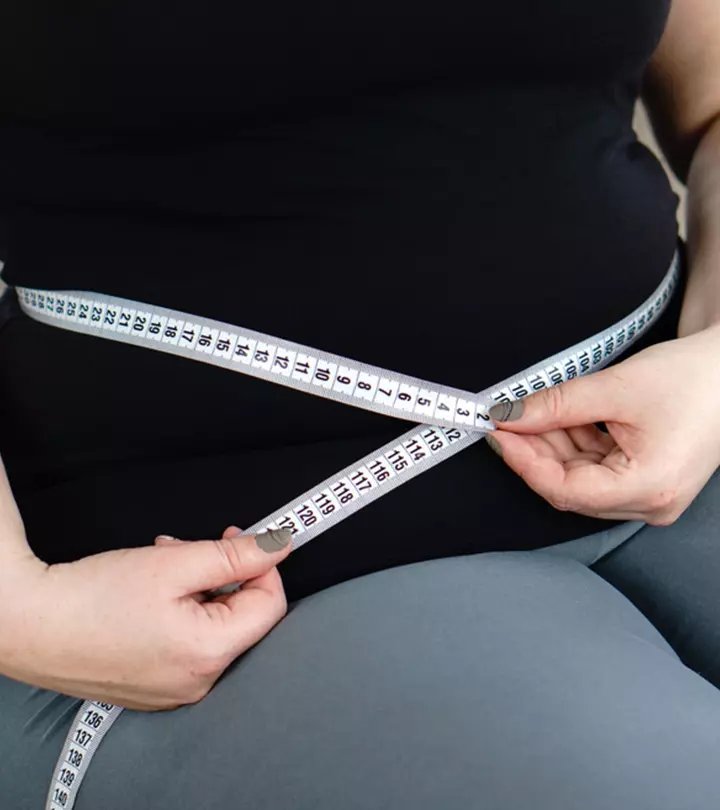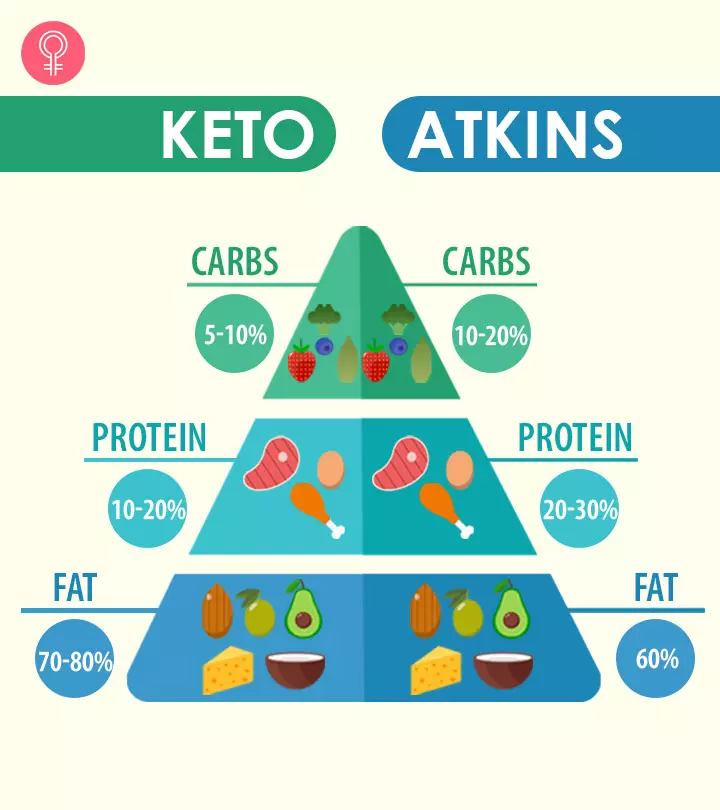Does Birth Control Cause Weight Gain? 4 Surprising Truths
Understand the misconceptions and unpack the real reasons behind your fluctuating weight.

Image: Shutterstock
Does birth control make you gain weight? If this question haunts your nights, we are here with an answer. Women tend to gain weight due to genetic factors or pregnancy or after reaching a certain age. Even certain medications (antidepressants and birth control) can cause weight gain. Now THAT is something to shed some light on. Some studies show that a few types of birth control may cause weight gain in women (1). But, other studies found no link between birth control and weight gain (2)!
The National Contraception Survey by the Spanish Contraception Society comprised 1801 women between the age of 14-49 years. It revealed that 78.7% of women used contraceptives during sexual intercourse. 18.5% of them used combined oral contraceptives, while 38.4% of them have used emergency oral contraception at least once. 66.8% do not make continuous use of contraception due to personal preferences.
Before you get more confused, let’s get to the point. Scroll down to check out the research links weight gain and birth control, what factors contribute to the weight gain associated with birth control pills, the type of birth control that actually causes weight gain, and more. Swipe up!
In This Article
Does Birth Control Cause Weight Gain?
There is so much mystery surrounding birth control and weight gain that nobody knows what is fiction and what is actual scientific fact. With the jury still out, let us see what both sides have to say about this.
- Contraceptive Pill And Weight Gain
Birth control pill or “the pill” as it is popularly known, is one of the birth control methods that is widely researched today. Research has shown that the pill may not cause women to gain weight. A study was conducted to understand the changes in weight after the administration of low-dose oral contraceptives. Results showed that the women did not gain weight, thus proving that birth control pills do not cause weight gain (2).
Sophie Jayne, a vlogger, details her experience with birth control pills and how she faced issues like weight gain, insecurities, and acne. She said, “I definitely put on weight, which I know a lot of people do experience (i).”
- Birth Control Shot And Weight Gain
While the pill does not cause you to gain weight, research has suggested that there is one type of birth control that may contribute to gaining those extra pounds. Medroxyprogesterone acetate commonly known as the birth control shot, contains the hormone progestin, a synthetic hormone that mimics progesterone. If you are wondering ‘Does progesterone cause weight gain?‘, the answer is not straightforward. However, it is important to note that this shot is given every three months to prevent pregnancy. A study was conducted where 703 women were given the birth control shot and their body weight was measured for three years. The researchers concluded that the women had gained 11 pounds over three years with a 3.4% increase in body fat (1).
As you can see, there are studies that show the pill may not cause you to gain weight, but on the other hand, the shot has been suggested to cause weight gain. Let us read on further to understand what are the possible factors that may contribute to birth control causing weight gain.
Key Takeaways
- Science indicates that birth control pills do not induce weight gain, while the birth control shot does.
- A few factors that could make you gain weight through birth control are genetics and water retention.
- Other forms of birth control like the patch, vaginal rings, and implants were studied to show no effect on body weight.
- Following a few simple practices can prevent weight gain – these include exercising, hydrating regularly, and eating healthy.
Possible Contributing Factors For Weight Gain Associated With Birth Control

With the debate still going on about whether birth control makes you gain weight or not, experts have found factors that may contribute to women gaining weight post birth control.
- Genetics
Did you know that your genes may play a role in gaining weight while you’re under birth control? A study was conducted on 276 women from diverse ethnical backgrounds to check the effect of etonogestrel implants, a type of hormonal implant, on weight. They found that the women had gained around seven pounds over twenty seven months. The researchers suggested that this weight gain to the variation of the gene, Estrogen Receptor 1, that is responsible for the production of milk (3). However, the study also states the necessity of further genetic research to substantiate its findings.
- Water Retention
Many women stop taking birth control once they see that they have gained a few extra pounds. Researchers have indicated that this gain in weight may be due to water retention in your body. Birth control pills contain synthetic progesterones that may cause hormonal fluctuations. This may lead to high levels of estrogen, which is linked to water retention (4). While this has been seen in some cases, it is not a matter of concern because doctors say that this weight will go away in a matter of a few months.
Water retention and genetics are factors that you did not know but may be contributing to weight gain post birth control consumption. It may look like birth control pills can cause bloating or weight gain, but it may not be the case. Let us see what research has to say about various types of birth control and weight gain.

What Research Says About Birth Control Types And Weight Gain

“Does birth control make you gain weight?” Do all types of birth control make you gain weight? Let us see what science says about different types of birth control and whether they cause you to gain those extra pounds or not.
- Birth Control Patch
Birth control patch or the contraceptive patch is used by many women all over the world. It is a patch that you put on your skin which suppresses your ovulation by releasing progesterone and estrogen into your bloodstream. These hormones thicken the cervical mucus, which makes it difficult for the sperm to move inside your cervix. However, some women may experience hormonal weight gain as a side effect. Researchers conducted a review of forty nine studies to understand the effect of birth control patches on weight gain. They found that the patch had no effect on women’s body weight (5).
- Intrauterine Devices (IUD)
Intrauterine device is a t-shaped coil that is inserted into a woman’s cervix to stop the sperm from fertilizing the egg. A study was done to see the effect of hormonal iud, copper iud and birth control implant on weight on a group of women between the ages of 15 to 45 years for 12 months. The results showed a slight decrease in weight for women using copper and hormonal IUDs while hormonal implant users showed a slight increase in weight (6). This suggests that IUDs may not cause any weight gain, but more research needs to be conducted in this area.
- Vaginal Rings
Before we understand whether vagina rings cause us to gain weight or not, let us first understand how a vaginal ring works. A vagina ring is a plastic ring that is inserted into your vagina. It contains two hormones that are essential for preventing ovulation— progesterone and estrogen. By thickening your cervical mucus and thinning the lining of your uterus, the vaginal ring prevents you from ovulating. A study was conducted to see the effect of Nuvaring and an oral contraceptive on body weight. The results showed that there was no difference in body weight in both groups of women (7).
- Birth Control Implant
This is a type of birth control where a flexible, plastic rod is put under the skin of your upper arm. It releases the hormone progesterone which thickens your cervical mucus, preventing ovulation. A study was conducted to see the effect of birth control implants on women’s observed and perceived body weight for three months. The researchers found that there was no evidence of observed body weight in women due to the implant, even though they reported a perceived gain in their weight (8).
The American College of Obstetricians and Gynecologists reports that adolescents who use contraceptive pills, birth control patches, vaginal rings, and IUDs do not experience an increase in body weight or a change in body composition (9).
What Types Of Pills Are Most Likely To Cause Weight Gain?
While the above methods have been indicated by research to not affect body weight in women, there are other methods of birth control that women opt for today. The most common and one of the most popular methods of birth control is pills. Many women have reported that they had gained weight after going on the pill. Let us take a look at what researchers have to say about this.
- Combined Pills
Also known as Combined Oral Contraceptives (COC), combined pills are made up of a combination of two hormones, estrogen and progesterone. A literature review was done to see the effect of combined pills on weight. The researcher did not find any evidence that suggests that consumption of combined pills can cause weight gain (10).
- Progestin-only Pills
Progestin pills are a type of oral contraceptive which contains the female hormone progestin, which is used to prevent the eggs from becoming fertilized. Research has shown that progestin pills do not cause any significant increase in weight (11).
 Trivia
TriviaWe can see from the above points that both combined pills and progestin-only pills have indicated that there is no association between them and weight gain. More research is needed to be done in this area to come to a conclusion. Let us see how to know which of these birth control methods is best for you.
How To Choose The Right Birth Control?
Consult a medical professional to properly understand your body, medical history, and other important factors and decide what type of birth control suits you the best. Additionally, keep the following in mind when discussing your requirements with a doctor:
- The kind of lifestyle you have and which method will be convenient to it.
- The side effects you may experience with each method.
- Mention if you take any other medication and for what to avoid adverse interactions.
- The budget versus the effectiveness of the birth control method.
Just make sure you have all your queries answered and choose an option that you feel meets all your needs. Now let us see how you can prevent or lose any short-term weight gain after starting your birth control plan.
How Can You Prevent Short-term Weight Gain After Starting Birth Control?
Studies have shown that most contraceptives have shown that there may not be any risk of gaining weight once you start using your choice of birth control. Even if you do gain weight, it is mostly due to water retention which goes away within a few months. But if you are still worried about gaining those extra pounds, then you can follow these simple tips that can prevent you from gaining those extra pounds and help you lead an overall healthy lifestyle.
- Exercise
Every doctor in the world will say this without fail. No matter how many doctors you visit, they will all say and will continue to say that you must engage in physical activity to keep your body healthy. Physical activity is beneficial for not only losing weight, keeping your metabolism churning regularly, but also for providing a better lifestyle. Also, you may try resistance training. It is one of the best forms of exercise for weight loss, as it helps build muscle, and it takes more energy to build and maintain muscles than body fat. Therefore, building muscles may speed up your metabolic rate.
- Drinking Water Daily
Drinking seven to eight glasses of water everyday
is a must. It not only avoids bloating, but also keeps your hunger pangs and snack cravings at bay. This protects you from gaining any extra weight.
- Eating The Right Food
Eating food that nourishes your body is imperative for a long and healthy life. Eating a diet rich in vegetables, fruits, proteins, whole grains, nuts, and seeds, and avoiding processed food can help you reduce weight and lead a healthier life.
 Pro Tip
Pro TipAccording to the Harvard Medical School, dieting is a fast path to weight loss. You need to burn approximately 3,500 calories to lose a single pound. Therefore, consuming 500 fewer calories a day will result in the loss of a pound in a week (12).
Getting your daily intake of water, some physical exercise and eating the right food can help you prevent those numbers from going up. Let us see what are the other factors that contribute to you gaining weight.
Does birth control make you gain weight? The answer depends on what type of birth control you are using. According to research, birth control pills and patches, intrauterine devices, vaginal rings, and birth control implants do not lead to weight gain. However, one type of birth control, medroxyprogesterone acetate (commonly called the birth control shot), may lead to weight gain. But the blame for weight gain cannot always be pinned on birth control, as there are several other factors responsible for it, like genetics and water retention. If you are still worried about gaining weight, you can reduce this possibility by exercising frequently, drinking lots of water, eating the right food, and eliminating processed and junk food.
Frequently Asked Questions
Does birth control make it hard to lose weight?
A few types of birth control may lead to weight gain. Other birth control practices don’t affect your weight in any way. Healthy eating and an active lifestyle can help you lose weight even while using birth control practices.
Does birth control change your body shape?
Depending on the type of birth control, a gain in weight might lead to changes in your body shape.
Will birth control make my breasts bigger?
While birth control pills may affect your breasts, it doesn’t lead to any permanent increase in size.
Watch the following video to explore whether birth control contributes to weight gain. It goes into great detail about the effects and misconceptions surrounding birth control and weight to help you make informed decisions.
Personal Experience: Source
StyleCraze's articles are interwoven with authentic personal narratives that provide depth and resonance to our content. Below are the sources of the personal accounts referenced in this article.
(i). The pill, weight gain, insecurities + acnehttps://www.youtube.com/watch?v=ZnqgV-R_vOE&t=16s
References
Articles on StyleCraze are backed by verified information from peer-reviewed and academic research papers, reputed organizations, research institutions, and medical associations to ensure accuracy and relevance. Read our editorial policy to learn more.
- Changes in Weight Total Fat Percent Body Fat and Central-to-peripheral Fat Ratio Associated with Injectable and Oral Contraceptive Use
https://pubmed.ncbi.nlm.nih.gov/19254592/ - Weight Change and Adverse Event Incidence with a Low-dose Oral Contraceptive: Two Randomized Placebo-controlled Trials
https://pubmed.ncbi.nlm.nih.gov/11672550/ - An Exploratory Analysis on the Influence of Genetic Variants on Weight Gain Among Etonogestrel Contraceptive Implant Users
https://www.contraceptionjournal.org/article/S0010-7824(20)30150-5/fulltext - Oral contraceptives and renal water handling
https://pmc.ncbi.nlm.nih.gov/articles/PMC5727291/ - Contraception: Do Hormonal Contraceptives Cause Weight Gain?
https://www.ncbi.nlm.nih.gov/books/NBK441582/ - Combination Contraceptives: Effects on Weight
https://www.cochranelibrary.com/cdsr/doi/10.1002/14651858.CD003987.pub5/full - Weight Gain Associated With LARC Within a Racially Diverse Patient Population
https://journals.lww.com/greenjournal/Abstract/2025/05001/Weight_Gain_Associated_With_LARC_Within_a_Racially.355.aspx - Effects on Cycle Control and Bodyweight of the Combined Contraceptive Ring NuvaRing Versus an Oral Contraceptive Containing 30 Microg Ethinyl Estradiol and 3 mg Drospirenone
https://pubmed.ncbi.nlm.nih.gov/16763008/ - Association of Progestin Contraceptive Implant and Weight Gain
https://journals.lww.com/greenjournal/Fulltext/2016/03000/Association_of_Progestin_Contraceptive_Implant_and.21.aspx - Obesity in Adolescents
https://www.acog.org/clinical/withdrawn-document?utm_source=redirect&utm_medium=web&utm_campaign=int - Weight gain on the combined pill–is it real?
https://pubmed.ncbi.nlm.nih.gov/11045873/ - Progestin-only contraceptives: effects on weight
https://pubmed.ncbi.nlm.nih.gov/27567593/ - Tips to help you reach your exercise and weight loss goals
https://www.health.harvard.edu/healthbeat/tips-to-help-you-reach-your-exercise-and-weight-loss-goals
Read full bio of Samantha Blanton
Read full bio of Varsha Patnaik
Read full bio of Ravi Teja Tadimalla
Read full bio of Aparna Mallampalli



























Community Experiences
Join the conversation and become a part of our empowering community! Share your stories, experiences, and insights to connect with other beauty, lifestyle, and health enthusiasts.